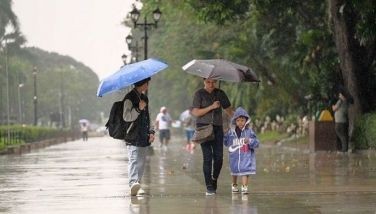Amnesty warns of resurgence in killings, disappearances in RP
MANILA, Philippines – Even with the decline in the cases of human rights violations after an uproar from the international community rocked the Arroyo government last year, there could be a resurgence of unexplained killings and enforced disappearance in the absence of any “actual prosecution” of those implicated in these cases, the London-based human rights group Amnesty International said yesterday.
While noting the need for the Arroyo administration to implement measures that would ensure the resolution of these cases, the international human rights watchdog also expressed concern over the appointment of former Armed Forces of the Philippines chief of staff Gen. Hermogenes Esperon Jr. to the Office of the Presidential Adviser on the Peace Process (OPAPP), noting that it was during his term that the “upsurge” in human rights violations occurred.
During yesterday’s launch of the group’s annual “State of the World’s Human Rights,” Dr. Aurora Parong, section director of AI-Philippines, said cases of unexplained killings have declined from 70 cases in 2006 to 33 cases in 2007, based on the group’s tally.
Parong said international pressure “served as a warning to the perpetrators” that might have led to the decline in the cases of human rights violations.
“But if there’s no actual prosecution of the perpetrators, it will not be far-fetched to think that there will be a resurgence of extrajudicial executions and enforced disappearances,” Parong said.
“Actual prosecution” refers to arriving at actual decisions on cases and not just bringing those cases to court.
“In the Philippines, some cases take around 10 years until the decision is handed down. There should be faster prosecution,” she said.
Bringing cases to court, she said, is just “paper victories.”
“Enforcement is the key aspect that needs to be done here,” she added.
According to Parong, a concerted effort of all the branches of government is necessary.
She said legislators could strengthen the witness-protection program that would encourage witnesses to come out.
The judiciary must ensure that judges are able to identify what constitutes an extrajudicial execution.
While there are special courts that have been designated to hear human rights cases, she expressed concern over whether these were really competent to handle cases of political killings and enforced disappearances.
Parong said the Department of Justice must also do its part as it has power over state prosecutors.
Nymia Simbulan, executive director of the local group Philippine Human Rights Information Center, seconded Parong’s statements.
The AI report included separate reports on other states but the portion on the Philippines stated that among the most controversial issues in the Arroyo government are corruption, impunity and the lack of political will to give justice to victims of human rights violations.
“Corruption remains endemic not only in the Philippines but throughout the region, and it seems particularly prevalent in some of the societies least able to afford it. Corruption constitutes a significant economic drain that especially hurts the poor; it also fosters an environment of lawlessness and impunity. When we talk about increasing the rule of law, the notion of accountability for human rights abuses is the same impulse that helps combat corruption,” Parong said.
For her part, Commission on Human Rights chairperson Leila de Lima said there are around 400 cases currently pending before her office covering the period from 2001 to 2008.
“We have to be serious and firm about the investigating power of the CHR,” she said.
Parong likewise said that while they are concerned about the appointment of Esperon to the OPAPP, they will give him the benefit of the doubt and are hopeful that there will be a development in the peace negotiations under his term.
- Latest
- Trending































